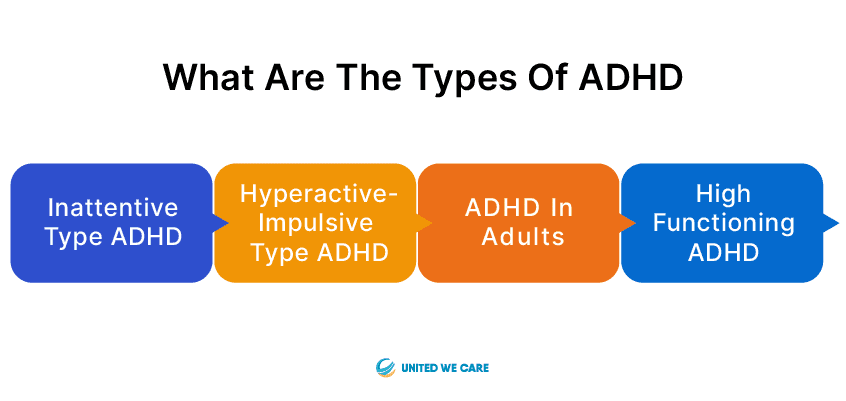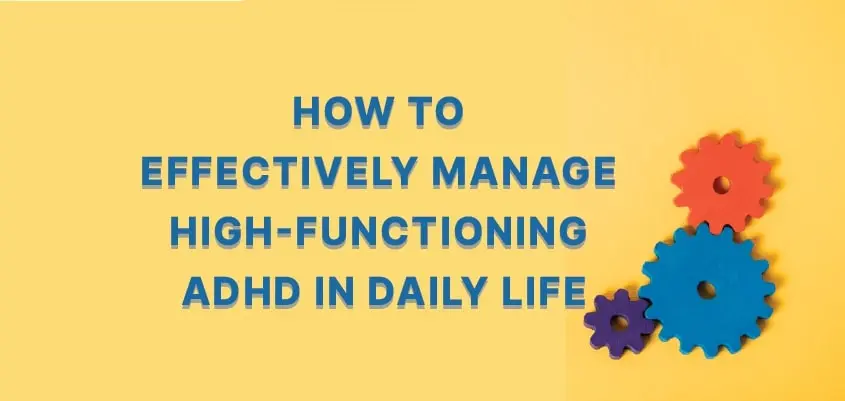INTRODUCTION
People with High functioning ADHD are competent and thriving, despite facing challenges with attention and hyperactivity. They have learned ways to cope with and manage their symptoms, allowing them to excel personally and professionally. However, there may come a point where the strategies they’ve developed are no longer effective, leading to difficulties in functioning and increased stress. At this point, it may be necessary to seek additional support or interventions to manage ADHD symptoms.
What Are The Types of ADHD

There are three different types of ADHD that a person can have: Inattentive, hyperactive-impulsive, or combined. These different types describe how ADHD shows up in people. Some people with ADHD might have difficulty focusing on things they’re not interested in, while others might feel like they always need to move around. If you have ADHD, you might experience some of these symptoms too.
Inattentive Type ADHD
If someone has inattentive type ADHD, they might show some specific symptoms like being disorganized, avoiding tasks that require a lot of effort, making careless mistakes, having trouble focusing on jobs they don’t enjoy, finding it difficult to maintain focus when someone talks to them directly, not finishing tasks they start, being forgetful or losing things, and getting easily distracted.
Hyperactive-Impulsive Type ADHD
Hyperactive-impulsive type is another type of ADHD. If someone has this type, they might show some specific symptoms like getting out of their seat at the wrong time, running or climbing when they shouldn’t, not being able to work or play quietly, having trouble waiting for their turn, fidgeting, moving around a lot like they’re “driven by a motor,” talking too much, blurting out answers before the question is finished, and interrupting others when they’re talking.
ADHD in Adults
ADHD affects adults and children, but the symptoms might look different for adults. Adults with ADHD may have trouble starting tasks, organizing and prioritizing their work, or focusing on tasks that require mental effort. They might also be impulsive or frustrated easily, although hyperactivity is less common in adults with ADHD. Some adults with ADHD might live chaotic lives, have other mental health issues, or even abuse drugs or alcohol.
High functioning ADHD
The term “high functioning” ADHD is sometimes used to describe individuals who have ADHD but can manage their symptoms to some extent, often through medication or other strategies. However, it’s important to note that even individuals with “high functioning” ADHD can still struggle with certain aspects of daily life, such as staying focused during long meetings or completing tasks that require sustained attention.
Symptoms of High-Functioning ADHD
High-functioning ADHD can affect adults in various ways, and the symptoms can differ from person to person. Some of the signs that are commonly associated with high-functioning ADHD include trouble focusing on tasks and finishing them, having difficulty reading or taking a long time to read something, struggling to pay attention during conversations and meetings, procrastinating and managing time poorly, being forgetful about appointments, facts or supplies, feeling sleepy during the day, changing priorities to do more enjoyable tasks first instead of more important or urgent tasks, and being impulsive, impatient or argumentative.
Read more – ADHD and Sleep Issues: 8 Solutions for Dealing With ADHD and Sleep Issues
Challenges and Concerns
People with high-functioning ADHD can present themselves well, leading to unique experiences and concerns. Instead of accepting that their ADHD symptoms can make life more difficult, they might believe it’s a personal weakness and feel incompetent. They may put a lot of effort into performing and presenting well, which can lead to exhaustion and burnout. Additionally, they often try to hide any indications of their struggles, which can make them feel isolated because they don’t share this experience with anyone.
Diagnosis and Treatment
Many people with high-functioning ADHD don’t get diagnosed until adulthood, and they may even get misdiagnosed because of how well they appear to be functioning. Sometimes, symptoms of other mental health conditions are noticed more quickly than the signs of ADHD. Suppose you’re an adult with high-functioning ADHD and looking for assessment and treatment. In that case, it’s essential to find a psychologist, mental health therapist, or psychiatrist specializing in testing and treating adult ADHD.
Strategies for Managing High-Functioning ADHD symptoms
Many people with ADHD, including famous people, have achieved great success. People with high-functioning ADHD often use compensation strategies to help them function at a higher level. These strategies include working hard to complete tasks, learning to extract meaningful information from partially read material, completing studies at the last minute, using reminders, notes, alarms, and notifications, and prioritizing tasks by importance and relevance.
Read more — ADHD and Depression
Coping Strategies for Managing High-Functioning ADHD symptoms
Various skills and strategies can be helpful for those struggling with ADHD symptoms. Take frequent breaks during tasks, and set reminders if needed. Keep a workspace free from distractions and clutter. Create a daily routine with small, achievable tasks. Use a planner or time management system to keep organized and make to-do lists for personal and work life. Break large tasks into smaller steps, and use online tools to automate tasks such as bill payment. Keep track of appointments and events using a calendar. Educate yourself about ADHD, and prioritize self-care with a healthy lifestyle, hobbies, socialization, and relaxation.
Management of High-Functioning ADHD Symptoms
ADHD cannot be cured, but its symptoms can be appropriately managed.
Meditation
Medications can help improve attention, memory, and behavior.
Therapies
Therapy, like cognitive behavioral therapy (CBT) or behavior therapy, can teach people essential skills to manage their symptoms and help them adjust to life changes. With CBT, people can learn to think before acting and manage impulsive behavior choices, and behavior therapy can teach skills like time management and organization.
Online resources for mental health support
The United We Care app can support mental health, including coping skills, journaling prompts, and goal setting. It also offers online therapy sessions with mental health professionals specializing in treating ADHD. The app is available for download on the Apple Store and Google Play Store.
Conclusion
High-functioning ADHD showcases the remarkable ability of individuals to excel in various areas despite the challenges posed by their attention deficit hyperactivity disorder. They can navigate their unique strengths and contribute meaningfully to society with proper support and strategies.
References:
[1]: Researchgate.net. [Online]. Available: https://www.researchgate.net/profile/Sven-Boelte/publication/7526440_ADHD_Asperger_syndrome_and_high-functioning_autism/links/5af85d740f7e9b026beb05b9/ADHD-Asperger-syndrome-and-high-functioning-autism.pdf. [Accessed: 16-May-2023].
[2]: K.-P. Lesch, “‘Shine bright like a diamond!’: is research on high-functioning ADHD, at last, entering the mainstream?,” J. Child Psychol: psychiatry, vol. 59, no. 3, pp. 191–192, 2018.









